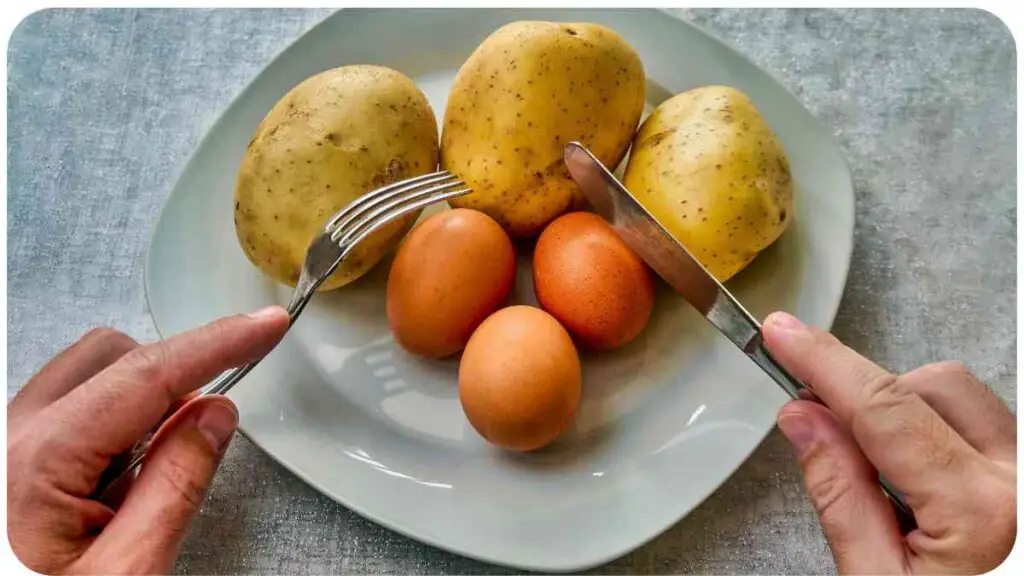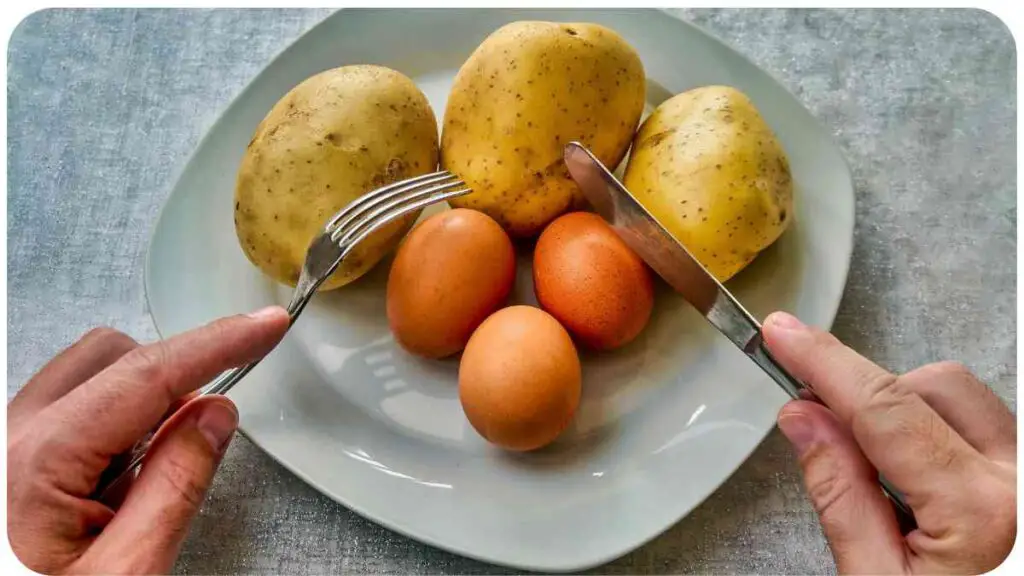Nutrition is a topic that often gets clouded by myths and misconceptions. It can be challenging to navigate through the overwhelming amount of conflicting information available. In this article, we will debunk some common nutrition myths, empowering you with accurate knowledge to make informed dietary choices.
Through years of experience in the field, we will provide insights, tips, and anecdotes to engage and inform readers.
| Takeaways from the Blog |
| Nutrition myths can lead to misconceptions and unhealthy behaviors. |
| It’s important to critically evaluate nutrition information and rely on scientific evidence. |
| Prioritize whole, nutrient-dense foods for a balanced diet. |
| Listen to your body’s cues and seek guidance from healthcare professionals for personalized nutrition advice. |
| Education and awareness play a crucial role in debunking nutrition myths and promoting healthier choices. |
Myth #1: Carbohydrates Are Bad for You
Carbohydrates have received a bad reputation in recent years. It is important to understand that not all carbohydrates are created equal. While refined carbohydrates found in processed foods can lead to weight gain and health issues, complex carbohydrates found in whole grains and fruits are essential for optimal health.
When it comes to understanding organic foods, it’s important to separate fact from fiction. This comprehensive guide on organic foods provides valuable insights into their benefits and potential impact on your overall health.
Table: Good Carbohydrate Sources
| Food | Carbohydrate Content (per 100g) | Health Benefits |
| Quinoa | 21.3g | High in fiber and protein, aids in blood sugar control |
| Sweet Potatoes | 20.1g | Excellent source of vitamin A and C, supports immune function |
| Whole Wheat Bread | 44.7g | Rich in fiber, B vitamins, and minerals |
| Oats | 66g | Contains soluble fiber and supports heart health |
| Blueberries | 14.5g | Packed with antioxidants and essential vitamins |
Including these healthy carbohydrate sources in your diet can provide energy, essential nutrients, and support overall well-being.
Myth #2: Fat-Free Foods Are Always Healthy

Many people believe that avoiding fat is the key to a healthy diet. While it is important to limit saturated and trans fats, not all fats are harmful. In fact, our bodies require healthy fats for various functions, including hormone production, nutrient absorption, and brain health.
Table: Healthy Fats to Include in Your Diet
| Food | Fat Content (per 100g) | Health Benefits |
| Avocado | 14.7g | Rich in monounsaturated fats, supports heart health |
| Olive Oil | 100g | Contains monounsaturated fats and antioxidants |
| Almonds | 49.4g | High in healthy fats, fiber, and vitamin E |
| Salmon | 13.4g | Excellent source of omega-3 fatty acids and protein |
| Chia Seeds | 31.0g | Rich in omega-3 fatty acids and fiber |
Incorporating these sources of healthy fats into your diet can promote satiety, improve heart health, and support overall well-being.
Myth #3: Skipping Meals Helps in Weight Loss
Some believe that skipping meals is an effective weight loss strategy. However, this myth can do more harm than good. Skipping meals can lead to overeating, increased cravings, and a slower metabolism. Instead, focus on consuming balanced meals throughout the day to keep your energy levels steady and your metabolism functioning optimally.
Confused by food additives? Decode the labels with this quick guide and gain a better understanding of what goes into your meals. Empower yourself to make informed choices about the foods you consume.
Table: Benefits of a Balanced Meal Plan
| Benefit | Description |
| Sustained energy levels | Regular meals provide a consistent flow of energy, preventing energy crashes and fatigue |
| Better appetite control | Balanced meals with protein, fiber, and healthy fats help keep you feeling satisfied for longer |
| Enhanced metabolism | Eating regular meals helps maintain a steady metabolic rate, supporting weight management |
| Improved nutrient absorption | A balanced meal plan ensures you consume a variety of essential nutrients for optimal health |
| Stable blood sugar levels | Balanced meals help regulate blood sugar, reducing the risk of cravings and energy fluctuations |
By adopting a balanced meal plan, you can support your weight management goals and overall health.
Myth #4: All Calories Are Created Equal
One common misconception is that all calories are the same regardless of their source. While calories provide energy, the nutritional value of the foods you consume is equally important. Focusing on nutrient-dense foods that supply essential vitamins, minerals, and antioxidants is vital for nourishing your body and maintaining good health.
Table: Nutrient-Dense Foods to Incorporate
| Food | Nutrients | Health Benefits |
| Kale | Vitamins A, C, K, calcium | Supports bone health and provides antioxidants |
| Berries | Vitamin C, fiber, antioxidants | Promote brain health and protect against oxidative stress |
| Greek Yogurt | Protein, calcium, probiotics | Supports gut health and provides a good source of protein |
| Lentils | Protein, fiber, iron, folate | Aids in digestion and helps maintain balanced blood sugar levels |
| Walnuts | Omega-3 fatty acids, antioxidants | Supports brain health and helps reduce inflammation |
By emphasizing nutrient-dense foods, you can maximize the benefits of the calories you consume and boost your overall well-being.
Myth #5: Detox Diets Cleanse Your Body

Detox diets have gained popularity as a way to cleanse the body of toxins. However, the body has its own natural detoxification system consisting of the liver, kidneys, and lymphatic system. While certain foods can support this process, a short-term detox diet is not necessary for a healthy body. Instead, focus on incorporating foods that naturally support detoxification.
Are you tired of spending too much time in the kitchen? Discover these time-saving kitchen tools that will revolutionize your cooking experience. Spend less time prepping and more time enjoying delicious, nutritious meals
Table: Foods That Support Natural Detoxification
| Food | Detoxifying Properties |
| Lemon | Stimulates liver enzymes and aids digestion |
| Garlic | Enhances detoxification enzymes in the liver |
| Ginger | Helps eliminate toxins and reduces inflammation |
| Green Tea | Rich in antioxidants and promotes detoxification |
| Cruciferous Vegetables | Contains compounds that support liver detoxification |
Including these detoxifying foods in your diet can support your body’s natural detoxification processes and promote overall health and well-being.
Myth #6: Protein Supplements Are Essential for Building Muscle
The misconception that protein supplements are necessary for building muscle is widespread. While protein is indeed essential for muscle growth and repair, it can be adequately obtained from whole food sources. Incorporating a variety of high-protein foods into your diet will provide the necessary amino acids to support your fitness goals.
Table: High-Protein Foods for Muscle Growth
| Food | Protein Content (per 100g) | Additional Nutrients and Benefits |
| Chicken Breast | 31g | High-quality protein, low in fat |
| Greek Yogurt | 10g | Provides protein and probiotics for gut health |
| Quinoa | 4.4g | Protein-rich grain with essential amino acids |
| Lentils | 9g | Plant-based protein with fiber and micronutrients |
| Tofu | 8g | Vegetarian source of protein with low saturated fat |
By incorporating these high-protein foods into your meals, you can support muscle growth and repair without the need for excessive protein supplements.
Myth #7: All Organic Foods Are Healthy
While organic foods have gained popularity due to their reduced pesticide and synthetic fertilizer use, it’s important to note that not all organic foods are inherently healthy. Processed organic foods can still be high in added sugars, unhealthy fats, and sodium. Opting for whole, fresh, and pesticide-free produce is a better choice for promoting overall health.
With the rise of plant-based eating, it’s easier than ever to incorporate more veggies into your diet. Explore this guide on plant-based eating and discover flavorful and nutritious ways to add more vegetables to your meals
Table: Pesticide-Free Organic Foods
| Food | Organic Varieties to Consider |
| Apples | Choose organic to reduce pesticide exposure |
| Spinach | Organic spinach is often low in pesticide residue |
| Tomatoes | Organic tomatoes are free from synthetic pesticides |
| Bell Peppers | Opt for organic to avoid chemical residues |
| Strawberries | Choose organic for reduced pesticide exposure |
By selecting organic varieties of these foods, you’ll reduce exposure to harmful pesticides and enjoy the benefits of fresh produce.
Myth #8: Gluten-Free Diets Are Healthier
Gluten-free diets have gained popularity, with many believing that they are inherently healthier. However, unless you have gluten intolerance or celiac disease, eliminating gluten may not provide any additional health benefits. It’s important to note that gluten-free products often contain more added sugars and refined grains, which can be detrimental to overall health.
Table: Gluten-Free Grains and Their Benefits
| Grain | Health Benefits |
| Quinoa | High in protein and essential amino acids |
| Brown Rice | Nutrient-rich and a good source of fiber |
| Buckwheat | Rich in antioxidants and supports heart health |
| Amaranth | High in protein, iron, and calcium |
| Millet | Gluten-free grain with beneficial antioxidants |
Incorporating these gluten-free grains into your diet can provide variety and additional nutrients without sacrificing gluten-free status.
Understanding food labels is crucial for making informed choices about your diet. Dive into this comprehensive guide on food labels and equip yourself with the knowledge to select healthier options and avoid falling for misleading marketing tactics
Myth #9: Fruit Should Be Avoided Due to High Sugar Content
It is often misunderstood that fruits should be avoided due to their natural sugar content. While fruits do contain sugar, they also provide essential vitamins, minerals, fiber, and antioxidants. The sugar in fruit is accompanied by fiber, which helps slow down the absorption of sugar into the bloodstream. Eating a variety of fruits in moderation is a healthy choice for most people.
Table: Low-Sugar Fruits to Enjoy
| Fruit | Sugar Content (per 100g) | Additional Nutrients and Benefits |
| Berries | 4-9g | Antioxidants and high in fiber |
| Cherries | 8g | Contains anti-inflammatory properties |
| Apples | 10g | Rich in fiber and vitamin C |
| Grapefruit | 6g | High in vitamin C and supports weight management |
| Kiwi | 9g | Packed with vitamin C and dietary fiber |
Including these low-sugar fruits in your diet can satisfy your sweet cravings while providing essential nutrients and health benefits.
Myth #10: Supplements Can Replace a Balanced Diet

Supplements are often seen as a quick fix to meet nutritional needs. While they can be helpful in certain situations, they cannot replace a healthy and well-balanced diet. Whole foods provide a wide range of nutrients, fiber, and bioactive compounds that work synergistically to support optimal health. Supplements should be used to complement a healthy diet, not as a substitute.
Table: Essential Vitamins and Minerals for Optimal Health
| Nutrient | Food Sources | Functions |
| Vitamin C | Citrus fruits, bell peppers, strawberries | Antioxidant, immune support, collagen synthesis |
| Vitamin D | Fatty fish, sunlight exposure | Supports bone health, immune function |
| Calcium | Dairy products, leafy greens, almonds | Bone health, muscle function, nerve function |
| Iron | Red meat, legumes, spinach | Oxygen transport, energy production |
| Omega-3 fatty acids | Fatty fish, flaxseeds, chia seeds | Brain health, heart health, inflammation reduction |
While supplements can be beneficial for certain individuals with specific needs, it’s best to prioritize a varied and nutrient-dense diet to ensure optimal nutrient intake.
Myth #11: Eating Late at Night Causes Weight Gain
There is a common belief that eating late at night causes weight gain. The timing of your meals is not the primary factor contributing to weight gain, but rather the overall caloric intake and the types of foods consumed. Balancing your meals throughout the day and choosing nutritious options is more important than the timing of your last meal. However, it’s advisable to opt for lighter, nutrient-dense snacks if you’re hungry late at night.
Table: Healthy Late-Night Snacks to Enjoy
| Snack | Benefits |
| Greek Yogurt with Berries | Protein, fiber, and antioxidants |
| Hard-Boiled Eggs | High-quality protein and filling |
| Mixed Nuts | Healthy fats, protein, and fiber |
| Sliced Vegetables with Hummus | Fiber, vitamins, and minerals |
| Cottage Cheese with Fruit | Protein, calcium, and natural sweetness |
Choosing these nutritious, portion-controlled snacks can satisfy hunger and support a healthy lifestyle, even if consumed late at night.
Myth #12: Carbohydrates Should Be Avoided for Weight Loss
Carbohydrates often get a bad reputation when it comes to weight loss. However, not all carbs are created equal. It’s important to differentiate between refined carbohydrates (such as white bread and sugary snacks) and complex carbohydrates (such as whole grains, fruits, and vegetables).
Complex carbohydrates provide essential nutrients, fiber, and energy for the body. They are a valuable part of a balanced diet and can support weight loss when consumed in appropriate portions. It’s the excessive consumption of refined carbohydrates that can contribute to weight gain.
Table: Healthy Carbohydrate Sources for Weight Loss
| Food | Benefits |
| Quinoa | High in fiber and protein, helps control appetite |
| Sweet Potatoes | Rich in vitamins, minerals, and fiber |
| Oats | High in fiber and provide a sustained release of energy |
| Legumes | Packed with protein, fiber, and complex carbohydrates |
| Berries | Low-calorie and high in fiber, provide antioxidants |
By incorporating these healthy carbohydrate sources into your meals, you can support weight loss while enjoying a variety of nutritious foods.
Myth #13: Drinking 8 Glasses of Water a Day is a Must
The recommendation to drink eight glasses of water a day is a common myth. While staying hydrated is essential, the amount of water you need can vary depending on factors such as age, sex, activity level, climate, and overall health. Rather than obsessing over a specific number, it’s best to listen to your body’s thirst cues and hydrate accordingly.
Table: Hydration Tips
- Drink water when you feel thirsty.
- Consume fruits and vegetables with high water content, such as watermelon and cucumbers.
- Keep a reusable water bottle with you to sip throughout the day.
- Monitor the color of your urine – if it is light yellow or clear, you are likely well-hydrated.
- Adjust your water intake based on your activity level and the climate.
Remember, proper hydration is important, but the specific amount of water you need can vary from person to person.
Myth #14: All Fats Are Unhealthy
The myth that all fats are unhealthy is quite common. However, not all fats are created equal. There are healthy fats that are essential for our bodies and can provide numerous health benefits. It’s important to include these healthy fats in our diets while limiting saturated and trans fats.
Table: Healthy Fats to Include in Your Diet
| Fat Source | Benefits |
| Avocado | Rich in monounsaturated fats, supports heart health |
| Olive Oil | Contains monounsaturated fats and antioxidants |
| Fatty Fish (Salmon, Tuna) | Excellent source of omega-3 fatty acids, supports brain and heart health |
| Nuts and Seeds | Provide a variety of healthy fats, fiber, and micronutrients |
| Coconut Oil | Contains medium-chain triglycerides (MCTs) and can support weight management |
Incorporating these healthy fats into your diet can have positive effects on heart health, brain function, and overall well-being.
Myth #15: Skipping Meals Helps in Weight Loss
Many people believe that skipping meals can aid in weight loss. However, this is a myth and can actually have negative effects on your overall health and weight management goals. Skipping meals can lead to overeating, increased cravings, and a slowed metabolism.
It’s much more beneficial to focus on eating regular, balanced meals throughout the day. This helps maintain stable blood sugar levels, keeps your energy levels steady, and supports a healthy metabolism. By nourishing your body with the right amount of nutrients at regular intervals, you can better manage your weight in a sustainable way.
Myth #16: Spot Reduction of Fat is Possible
The myth of spot reduction suggests that you can selectively lose fat from specific areas of your body by performing targeted exercises for those areas. Sadly, this is not true. When your body loses fat, it does so in a more general and systematic way rather than targeting specific areas.
Engaging in regular aerobic exercise, strength training, and maintaining a healthy diet can help you reduce overall body fat, but the specific areas from which you lose fat will be determined by your unique genetic makeup and overall body composition.
Instead of focusing on spot reduction, it’s more beneficial to aim for overall fat loss through a combination of regular exercise, a healthy diet, and maintaining a caloric deficit if weight loss is your goal.
Myth #17: Eating Before Bed Causes Weight Gain
There is a common myth that eating before bed leads to weight gain. However, weight gain occurs when your total calorie intake exceeds your body’s energy needs, regardless of the time of day you consume those calories.
While it’s not advisable to eat a heavy meal right before bed as it may disrupt sleep or cause discomfort, having a light, balanced snack a couple of hours before bed can be part of a healthy diet. Choose nutrient-dense options like a small serving of Greek yogurt, a handful of nuts, or sliced vegetables with hummus.
It’s important to focus on your overall daily calorie intake and the quality of your food choices rather than the specific timing of your meals. Listen to your body’s hunger and fullness cues, and make choices that align with your personal preferences and lifestyle.
Myth #18: All Processed Foods Are Unhealthy
The myth that all processed foods are unhealthy is not entirely accurate. While some processed foods can be detrimental to health due to high amounts of added sugars, unhealthy fats, and artificial additives, it’s important to distinguish between highly processed foods and minimally processed ones.
Table: Minimally Processed Foods That Can Be Part of a Healthy Diet
| Food | Example |
| Frozen Fruits and Vegetables | Flash-frozen to preserve nutrients and convenience |
| Canned Beans | Provides a convenient source of protein and fiber |
| Greek Yogurt Packs | Contains protein, probiotics, and can be portion-controlled |
| Whole Grain Bread | Provides fiber and is a healthier alternative to white bread |
| Nut Butter | Made from roasted nuts, providing healthy fats and protein |
While it’s best to prioritize whole, fresh foods in your diet, incorporating some minimally processed options can be convenient and nutritious. Be sure to read labels and choose products with simple, recognizable ingredients.
Myth #19: Eating Fat Makes You Fat
Another common myth is that eating fat makes you fat. However, dietary fat is an essential macronutrient that is necessary for the body to function properly. It’s true that fat is more calorie-dense compared to protein and carbohydrates, but consuming moderate amounts of healthy fats will not automatically lead to weight gain.
Healthy fats, such as those found in avocados, nuts, seeds, and olive oil, provide important health benefits. They promote satiety, support brain function, help absorb fat-soluble vitamins, and provide long-lasting energy. It’s the excessive consumption of calories, regardless of the macronutrient source, that can lead to weight gain.
Maintaining a balanced diet that includes moderate amounts of healthy fats, along with regular physical activity, is key to maintaining a healthy weight and overall well-being.
Conclusion
In conclusion, it’s important to critically evaluate the various nutrition myths that are prevalent in society. Many of these myths can lead to misconceptions and unhealthy behaviors.
By debunking these myths and understanding the scientific facts behind nutrition, we can make informed decisions about our diets and promote a balanced and sustainable approach to our overall health and well-being. Remember to prioritize whole, nutrient-dense foods, listen to your body’s cues, and seek guidance from healthcare professionals or registered dietitians for personalized nutrition advice.
Further Reading
Here are some additional resources to learn more about nutrition myths and their debunking:
1. Heart and Stroke Foundation – Nutrition Myths Busted
This article by the Heart and Stroke Foundation provides an overview of common nutrition myths and presents evidence-based information to debunk them. It highlights the importance of accurate nutrition knowledge for better health.
2. FYP365 – 9 Nutrition Myths Busted
FYP365 offers a detailed blog post that addresses nine common nutrition myths and provides explanations and scientific evidence to dispel them. It covers topics such as fat intake, carbohydrates, protein, and meal timing.
3. Nestle – Nutrition Myths Busted FAQs
Nestle’s “Nutrition Myths Busted” FAQs section answers commonly asked questions related to nutrition myths. It covers topics like sugar intake, obesity, organic food, and more, helping to clarify misconceptions and provide evidence-based information.
FAQs
What are some common nutrition myths about carbohydrates?
Carbohydrate myths often include beliefs that all carbs are bad for you, that they lead to weight gain, or that they should be eliminated from the diet. However, carbohydrates are an important energy source and can be part of a healthy diet when consumed in the right quantities and from wholesome sources.
Does eating fat make you fat?
No, eating fat does not automatically lead to weight gain. Healthy fats are essential for our body’s functions, and consuming moderate amounts of them can be part of a balanced diet. It’s excessive calorie intake, regardless of the macronutrient source, that contributes to weight gain.
Are all processed foods unhealthy?
Not all processed foods are unhealthy. While highly processed foods that contain added sugars, unhealthy fats, and artificial additives should be limited, minimally processed foods like frozen fruits and vegetables, canned beans, and whole grain bread can be part of a healthy diet.
Should I avoid all gluten for better health?
Unless you have a gluten intolerance or celiac disease, there is no need to avoid gluten. Gluten-free diets are essential for individuals with specific health conditions, but for the general population, eliminating gluten does not provide additional health benefits.
Is it true that eating late at night causes weight gain?
The timing of your meals is not the primary factor contributing to weight gain. Consuming excess calories, regardless of the time, can lead to weight gain. It’s advisable to opt for lighter, nutrient-dense snacks if you’re hungry late at night to support a healthy lifestyle.

Hi, I’m Hellen James! I’m a professional chef who has been cooking for over 12 years. In my career, I’ve worked at some of the world’s most prestigious hotels and restaurants. My expertise lies in creating recipes that are simple but delicious, and I love to experiment with new ingredients and techniques. I started this blog because I want to share my passion for cooking with everyone who loves food as much as I do.


